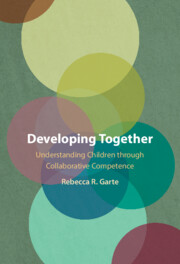Book contents
- Developing Together
- Developing Together
- Copyright page
- Dedication
- Contents
- Figures
- Tables
- Preface
- Acknowledgments
- Part I Collaborative Competence
- Part II Elements of Collaborative Competence
- Part III A New Theory and Method for Assessing Development via Collaborative Competence
- Chapter 7 Capturing the Complexity of Collaborations in Varied Settings
- Chapter 8 Principles for a Developmentally and Culturally Valid Methodology
- Chapter 9 Analyzing Components of Collaborative Competence during Preschooler Free Play
- Chapter 10 Collaborative Competence during Early Elementary Playful Learning Activities
- Part IV Implications for Theory, Research, and Practice
- References
- Index
Chapter 7 - Capturing the Complexity of Collaborations in Varied Settings
from Part III - A New Theory and Method for Assessing Development via Collaborative Competence
Published online by Cambridge University Press: 07 May 2024
- Developing Together
- Developing Together
- Copyright page
- Dedication
- Contents
- Figures
- Tables
- Preface
- Acknowledgments
- Part I Collaborative Competence
- Part II Elements of Collaborative Competence
- Part III A New Theory and Method for Assessing Development via Collaborative Competence
- Chapter 7 Capturing the Complexity of Collaborations in Varied Settings
- Chapter 8 Principles for a Developmentally and Culturally Valid Methodology
- Chapter 9 Analyzing Components of Collaborative Competence during Preschooler Free Play
- Chapter 10 Collaborative Competence during Early Elementary Playful Learning Activities
- Part IV Implications for Theory, Research, and Practice
- References
- Index
Summary
This chapter analyzes what makes highly affective collaborations unique and how the complexity of such collaborations can be studied. Drawing on previous research, it explores in-depth innovative methodologies that are designed to capture the key elements of complexity during productive interactions. Components of these methods are then applied to two distinct settings: preschooler free play and early elementary playful learning. The qualitative analysis of free play focuses on how synchrony, intersubjectivity, and shared meaning emerge in a dialectical relationship to each other over the course of interaction and how the coding captures the vicissitudes of complexity. An adaptation of the coding scheme for preschoolers is provided for observational coding of teacher-facilitated early elementary interactions that measures both intersubjectivity and exploratory talk. The preliminary results indicate patterns in the coding of episodes that are consistent with the theoretical premise discussed previously.
Keywords
- Type
- Chapter
- Information
- Developing TogetherUnderstanding Children through Collaborative Competence, pp. 113 - 136Publisher: Cambridge University PressPrint publication year: 2024

